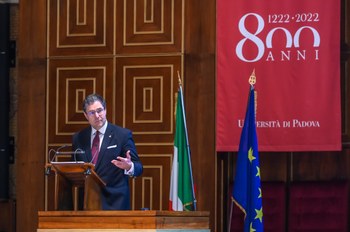Emeritus Professor, École Polytechnique Fédérale de Lausanne & University of Padua

11 June 2025 h. 14.30
Aula B, Complesso Belmeloro, Via Andreatta 8, Bologna
Climate is rapidly changing, and so should we. This implies not giving for granted invisible structures like privileges consolidated in time, uses and traditions of the place, political and social organizations, and the expressions of collective feelings. Rethinking built and natural environments will affect both the global North and the global South alike, forcing us to reconsider our Lebensraum (sensu Ratzel) and a new development ethics accounting for a fair distribution of privileges and resources. Questions like these are pressing: Will future large-scale water resources plans make compelling arguments for the reduction of the loss of biodiversity in fluvial landscapes? Is the structure of river networks a template for large-scale spread of waterborne disease infections? Are we capable to provide solid economic arguments for preventing water development schemes in the light of the social and economic cost of predicted increased burden of disease they would bring? Do biological invasions, including historic population migrations that shaped human community compositions, as we see them today, depend on physical constraints like the waterscape acting as the substrate for their dispersal? In this talk I will address the role that that social discounting applied to public policies acquires when the preservation of the natural capital in the fluvial landscape is at stake. This demands compelling quantitative assessments. Key to that end is our capability to predict the fate of water controls on living communities stemming from the recognition that the universality of form shown by the fluvial landscape affects decisively the predictability of their function as ecological corridors. The time is thus ripe to rethink the distributive justice in water resources management, as a path to reduce inequalities on a global scale. When I travel to the South of the world, I see that access to safe water distribution is socially biased, but the ownership of a cell phone is not. When we acknowledge that water management plans may cause loss of biodiversity or foster the spread of poverty-reinforcing disease, we easily account for the GDP impact of improved agriculture but usually fail to put a price tag on the ecosystem services we lose for good, nor to the true social and economic cost of disease. My take is this must change because we now have the right tools – reflected in water.
ANDREA RINALDO (Venice, 1954). Emeritus Professor at the University of Padua and the École Polytechnique Fédérale Lausanne. Honors degree in Engineering (Padua), PhD in Fluid Mechanics, Purdue University, two doctorates honoris causa. Research associate and visiting Professor at the Massachusetts Institute of Technology (1993-2001) and Princeton University (2004-2008). Royal Swedish Academy of Sciences, National Academy of Sciences and National Academy of Engineering of the USA, Accademia dei Lincei, Istituto Veneto di SSLLAA (as President, 2021-2027). In 2023 he received from HM the King of Sweden the Stockholm Water Prize.